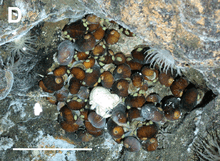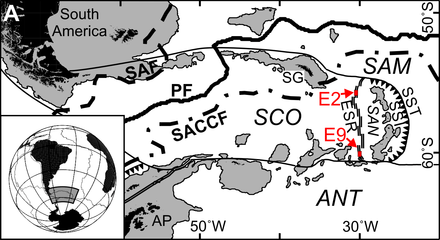Gigantopelta chessoia
| Gigantopelta chessoia | |
|---|---|
 | |
| View of a number of Gigantopelta chessoia (the brown snails) partially covered by limpets Lepetodrilus sp. (the small yellow-greenish oval shapes) at the East Scotia Ridge E2 hydrothermal vent site in the Scotia Sea. The scale bar is 10 cm. | |
| Scientific classification | |
| Kingdom: | Animalia |
| Phylum: | Mollusca |
| Class: | Gastropoda |
| (unranked): | clade Vetigastropoda |
| Superfamily: | Neomphaloidea |
| Family: | Peltospiridae |
| Genus: | Gigantopelta |
| Species: | G. chessoia |
| Binomial name | |
| Gigantopelta chessoia Chen, Linse, Roterman, Copley & Rogers, 2015[1] | |
Gigantopelta chessoia is a species of deep sea snail from hydrothermal vents, a marine gastropod mollusk in the family Peltospiridae.[1]
Taxonomy
The first information about this species, under the name "Peltospiroidea n. sp." or "peltospiroid gastropod", was published on 3 January 2012.[2] Peltospiroidea is the name of a superfamily of gastropods that was used in the taxonomy of the Gastropoda (Ponder & Lindberg, 1997). It contained the only extant family Peltospiridae (and some prehistoric gastropod families). However, the taxonomy of the Gastropoda (Bouchet & Rocroi, 2005) does not use the name Peltospiroidea (in that system, the family Peltopiridae is placed within the Neomphaloidea).
It was described as a new species within new genus Gigantopelta in 2015 and it was classified within the family Peltospiridae.[1]

Distribution
This species is known from two sites near hydrothermal vents in the East Scotia Ridge of the south Atlantic Ocean: from 2,394 m depth at the E9 vent site and from the 2,608 m depth at the E2 site.[2]
Description
The color of the shell is dark olive.[1] The shell has three to four whorls.[1] The width of the shell is from 4.21–45.7 mm.[1]
Ecology

This gastropod is generally found in dense aggregations up to ~1,000 m−2.[2]
Small limpets Lepetodrilus sp. East Scotia Ridge are sometimes found on the shells of Gigantopelta chessoia.[2] Other marine fauna, such as actinostolid sea anemones (family Actinostolidae), crabs in the genus Kiwa, and the pycnogonid arthropod or "sea spider" cf. Sericosura, can be found living together with this species.[2]
It is unclear if Gigantopelta chessoia has symbiotic bacteria in its enlarged oesophageal gland or not.[1] But body of Gigantopelta chessoia has low values of carbon isotope δ13C.[3] This can indicate, that carbon fixation in Gigantopelta chessoia may occur via Calvin-Benson-Bassham cycle by endosymbiotic Gammaproteobacteria.[3]
References
This article incorporates CC-BY-2.5 text from the reference[2]
- 1 2 3 4 5 6 7 Chen C., Linse K., Roterman C. N., Copley J. T. & Rogers A. D. (2015). "A new genus of large hydrothermal vent‐endemic gastropod (Neomphalina: Peltospiridae)". Zoological Journal of the Linnean Society 175(2), 319-335. doi:10.1111/zoj.12279.
- 1 2 3 4 5 6 Rogers A.D., Tyler P.A., Connelly D.P., Copley J.T., James R., Larter R.D., Linse K., Mills R.A., Garabato A.N., Pancost R.D., Pearce D.A., Polunin N.V., German C.R., Shank T., Boersch-Supan P.H., Alker B.J., Aquilina A., Bennett S.A., Clarke A., Dinley R.J., Graham A.G., Green D.R., Hawkes J.A., Hepburn L., Hilario A., Huvenne V.A., Marsh L., Ramirez-Llodra E., Reid W.D., Roterman C.N., Sweeting C.J., Thatje S. & Zwirglmaier K. (2012). "The Discovery of New Deep-Sea Hydrothermal Vent Communities in the Southern Ocean and Implications for Biogeography". PLoS Biology 10(1): e1001234. doi:10.1371/journal.pbio.1001234.
- 1 2 Reid W. D. K., Sweeting C. J., Wigham B. D., Zwirglmaier K., Hawkes J. A., McGill R. A. R, Linse K. & Polunin N. V. C. (2013). "Spatial Differences in East Scotia Ridge Hydrothermal Vent Food Webs: Influences of Chemistry, Microbiology and Predation on Trophodynamics". PLoS ONE 8(6): e65553. doi:10.1371/journal.pone.0065553.
External links
| Wikimedia Commons has media related to Gigantopelta chessoia. |
- Marsh L., Copley J. T., Huvenne V. A. I., Linse K., Reid W. D. K., Rogers A. D., Sweeting C. J. & Tyler P. A. (2012). "Microdistribution of faunal assemblages at deep-sea hydrothermal vents in the Southern Ocean". PLoS ONE 7: e48348. doi:10.1371/journal.pone.0048348